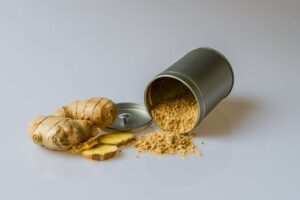
So last week I succumbed, finally-after about 2 years deliberation, and bought a juicer. They are smaller and less expensive now than they were two years ago, plus I now have room to actually store one. I keep reading recipes which involve juicing something or other as part or all of it, so I was getting a little narked that I couldn’t try them.
It arrived a few days ago and it is AMAZING – the first recipe I tried was a “Jump Start” morning juice containing carrot, apple, ginger (fresh, juiced) and a handful of mixed berries. The berries and carrot gave it just enough sweetness and the ginger – wow – that was definitely the jump start! I liked it so much I took a bottle to a neighbour’s get together and had everyone try it. They all loved it!
Now we all know ginger is great for stomach upsets, nausea (pregnant women particularly, but also post-op and people undergoing cancer treatment), and aiding digestion in general, but this made me want to look in to it in more depth and see what other health benefits this amazingly tasty spice might have. And guess what, there’s a whole bunch!
Ginger is among the healthiest and, I think it’s fair to say, one of the most delicious spices on the planet. It is also the most widely used dietary condiment in the world today. Fortunately, it is also loaded with nutrients and bioactive compounds that have powerful benefits for your body and brain.
The Chinese and Indians have used ginger tonics to treat ailments for over 4700 years. It was traded as a high value commodity during the Roman Empire, because of its medicinal properties.
The key ingredients is Gingerol, a bioactive compound with high anti-inflammatory and antioxidant properties. It is also where its unique flavor comes from. It can be used fresh (best), dried, powdered or as an oil or juice (which are also classed as fresh).
Ginger has been shown to be effective against exercise-induced muscle pain. It does not have an immediate impact, but may be effective at reducing the day-to-day progression of muscle pain and may reduce exercise induced muscle soreness. These effects are believed to be mediated by the anti-inflammatory properties.
There are some studies showing ginger to be effective at reducing symptoms of osteoarthritis. In a controlled trial of 247 people with osteoarthritis of the knee, those who took ginger extract had less pain and required less pain medication. Another study found that a combination of ginger, mastic, cinnamon and sesame oil, can reduce pain and stiffness in osteoarthritis patients when applied topically.
Ginger may also drastically reduce blood sugars and improve heart disease risk factors. Gingerols have been shown to naturally improve diabetes and enhance insulin sensitivity. A 2006 study showed that they could also suppress sorbitol accumulation in human blood cells. In layman’s terms, ginger not only helps prevent diabetes, but can also help reverse it! It also protects against diabetic complications like diabetic retinopathy. What an amazing spice!
It is ginger’s amazing anti-inflammatory properties which are leading scientists to believe that it may be of great assistance in the prevention and treatment of Alzheimers, various cancers and age-related cognitive decline. Oxidative stress and chronic inflammation can accelerate the aging process and are also big payers in all the disease that focus on destroying the immune system. (Can you see that we are back to our story on Toxic sugar and all the low level, but consistent, inflammation it causes in your body??)
Finally, as if all the above was not enough, ginger can also help fight off several forms of infection. In fact, ginger extract can inhibit the growth of many different types of bacteria. It is very effective against the oral bacteria linked to inflammatory diseases in the gums, such as gingivitis and periodontitis and may also be effective against the RSV virus, a common cause of respiratory infections.
The Journal of Microbiology and Antimicrobials (gripping read
In conclusion then, if you not all ready including ginger in your diet in some shape or form, I would suggest that you start, and an awesome juicer may make that a little easier, though you can also use the essential oil, but with care – it is very potent! PLease use only under the